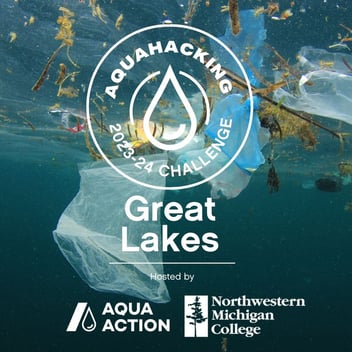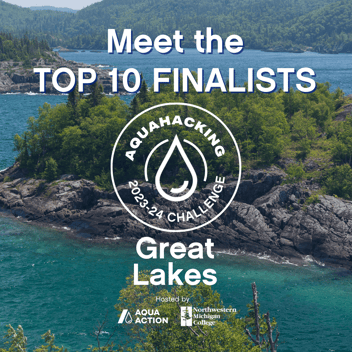-

AquaHacking Great Lakes Finalists Paving the Way for a Sustainable Blue Economy
The AquaHacking Great Lakes Challenge has reached an exciting stage where we now have the top 10 finalists who made it to the final round. These teams have been working tirelessly to find innovative solutions to the challenges faced by the Great Lakes region when it comes to water quality and sustainability.
Watch the TOP 10 announcement:
These pioneering solutions are not just ideas; they are actionable plans to safeguard our water resources. Let’s delve into the groundbreaking technologies developed by the finalists, poised to make a real impact on freshwater restoration and the creation of a new blue economy for a sustainable future!
Meet the finalists
AI for Water Quality:
Developed Aquawatch, a platform using advanced technology to analyze satellite images for water quality, providing real-time alerts to help manage and improve water conditions. Florida International University & University of West Florida, FL, USA.
Clean Water Nanotechnology-CWNT:
Proposes a Biosensor combined with machine learning to monitor water contaminants in real-time, initially for the beverage industry and later for public and private buildings, aiming to improve water safety, regulatory compliance, and environmental sustainability. Houghton, MI, USA.
Wave Lumina:
Wave Lumina has developed a portable Raman device to swiftly detect ultra-low levels of PFAS and other contaminants in environmental samples, revolutionizing on-site environmental assessments. Traverse City, MI, USA.
Baleena:
Designing microfiber-trapping filters for household washing machines, Baleena tackles microplastic pollution at its source. Philadelphia, PN, USA.
Motmot:
Deploying Autonomous Underwater Robotics in municipal water supply pipes. Motmot targets and measures lead levels, ensuring safe drinking water. Michigan State University, MI, USA.
MycoNaut:
Blending regenerative agriculture and fungi-based technology, MycoNaut pioneers cost-effective bioremediation solutions for PFAS-contaminated soils. Marquette, MI, USA.
Quantum Water:
Using insect-based carbon quantum dots, Quantum Water provides an innovative way to detect lead contamination in water. University of Waterloo, ON, Canada.
elerGreen:
Employing electrochemical reactors, elerGreen recovers valuable metals and polymers from wastewater, including lead contaminants. Toronto, ON, Canada.
Maxinano:
Leveraging electro-sorption technology, Maxinano captures charged plastic particles in water, reducing microplastic and nanoplastic pollution in our water. – Concordia University, QC, Canada
Proto-StLo:
Introducing a novel algal filtration technology, Proto-StLo reduces lead concentration in drinking water through powdered algal extract and pH regulation.- Champlain College St. Lawrence, QC, Canada.
As these innovators pave the way for a sustainable future, we express our deepest gratitude to the esteemed panel of judges who contributed their expertise:
- Michael Trigatti, Ovivo
- Doris Dossou, Visa
- Vlad Popovici, Mattr
- Matt Benson, Seamless Ventures
- Jessie Mitchell., Michigan Economic Development Corporation
- Jude Soundar, Microsoft
- John Coburn, XPV Water Partners
- Evan Pilkington, Foresight Canada
- John Gustincic, Central Michigan University
- Camille Hoisington, Traverse Connect
- Kat Kavanagh, Water Rangers (AquaAction Alumni)
- Daniel Olivier, Novarium
- Laila Benameur, AquaAction
- Guillaume Clairet, H2O Innovation
- Art Krueger, City of Traverse City, Michigan
Their collective expertise and commitment to fostering innovation have played a pivotal role in shaping the future of freshwater sustainability. We extend our heartfelt thanks
Learn more about the AquaHacking Challenge here : https://aquaaction.org/blog/challenge/great-lakes-2023-24/
Posted By:
Meet the AquaHacking Great Lakes Finalists
Read On

WaveMakers: AquaHacking Champions Ride the Innovation Tide in the Great Lakes
WaveMakers: AquaHacking Champions Ride the Innovation Tide in the Great Lakes
The AquaHacking

AquaAction and Northwestern Michigan College team up to launch the first bi-national AquaHacking Challenge for the Great Lakes - Aqua Action
Fighting the freshwater crisis: AquaAction and Northwestern Michigan College team up to launch...
